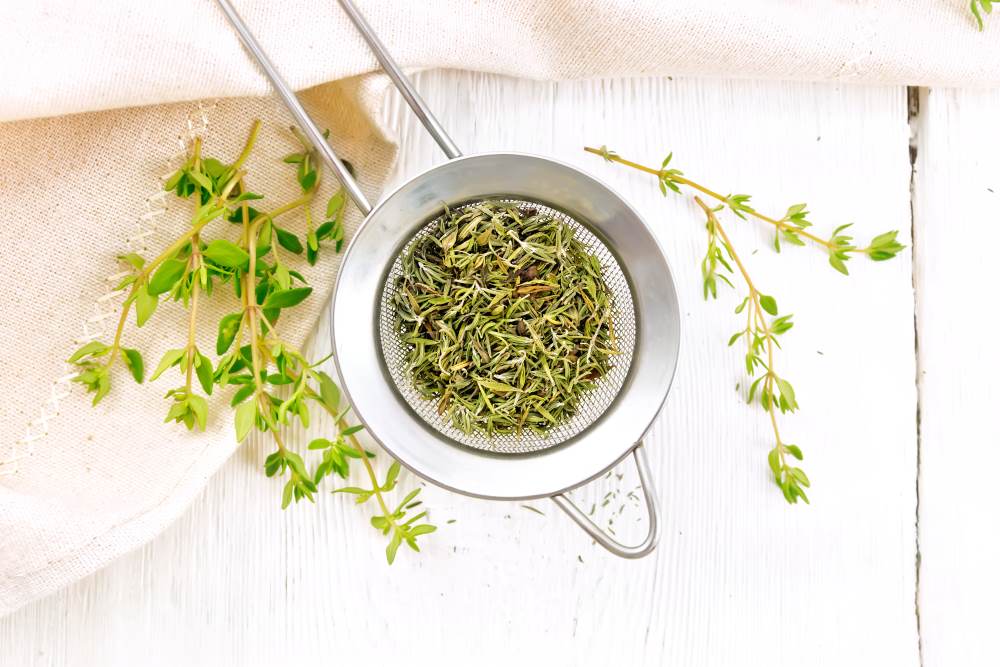16 Benefits of Thyme with Nutritional Values

Thyme, scientifically named Thymus vulgaris, is a member of the Liliaceae family. It contains thymol, p-cymene, borneol, myrcene, and linalool which are the main compounds responsible for its anti-bacterial, anti-fungal, and insecticidal properties. Additionally, there are several benefits of Thyme that you must be aware of so that you can make the most out of this medicinal plant.
Thyme has been traditionally used for its healing attributes, such as its antioxidant nature, fight against infections and anti-inflammation. Read more to learn about the health benefits of Thyme.

Table of Contents

Top 16 Health Benefits of Thyme

Thyme is rich in nutrients, giving it various therapeutic properties. The advantages of Thyme are as follows:
1. Helps Combat Acne
Thyme oil can effectively treat acne if you apply it to the affected areas daily. The main reason for this is the antibacterial properties of Thyme against the acne-causing germ, Cutibacterium acnes. However, there is not much evidence supporting the fact that Thyme oil effectively deals with pimples.
2. Treats Cough and Cold
Thyme has proven to be highly effective against cough and cold. Studies have shown that Thyme, along with ivy leaves, cured bronchitis symptoms to a significant extent. So, you can opt for a Thyme tea in case of excess cough.
3. Acts as a Disinfectant
One of the primary uses of Thyme oil is that it acts as an excellent disinfectant due to its antibacterial properties. It can effectively remove disease-causing bacteria from your home. However, it is not so effective against a very high concentration of mould in your house.
4. Boosts Mood and Spirit
One of the advantages of Thyme is that it can significantly uplift your mood when you are upset or depressed. This is because it contains a compound known as carvacrol, which stimulates the secretion of dopamine and serotonin, which are known to regulate your mood.
5. Boosts Immunity
Thyme contains several essential micronutrients such as vitamin A, vitamin C, iron, manganese, and copper. These nutrients considerably aid in boosting the immunity of an individual. However, you must consume Thyme in sufficient quantities to observe noticeable results.
6. Controls Pests
One of the significant uses of Thyme leaves is that they can effectively kill tiger mosquitoes that are primarily present in tropical and subtropical regions of Southeast Asia. Additionally, it has successfully fought bacteria, viruses, rats, and mice.
7. Prolongs Cooking Oil Stability
Scientists observed that Thyme significantly lengthens the stability of cooking oil. This is important since the lipid in cooking oil undergoes oxidation over time, leading to the loss of its stability, quality, safety, and nutritional value.
8. Improves Eyesight
One of the most noteworthy health benefits of Thyme is that it can help in improving the eyesight of an individual. The main reason behind this is the presence of Vitamin A, which maintains a healthy amount of mucus in the eyes. You can apply Thyme oil to your eyes in case of irritation to get relief.
9. Improves Heart Health
One of the medicinal benefits of Thyme is that it significantly reduces cholesterol in the blood. This, in turn, prevents severe blockages in your heart and safeguards you from a heart attack. So you can add Thyme leaves to your food to improve your heart health.
10. Disorders
Thyme oil has carminative properties due to the presence of essential oils. Also, it aids in anti-spasmodic movements to provide relief from muscle cramps. Moreover, it prevents the accumulation of harmful gases in the abdomen, thus helping relieve digestive disorders.
11. Treatment
reducDyspraxia is a neurological disorder that is mainly found in children. There are a lot of studies showing that Thyme effectively reduces the symptoms of Dyspraxia. However, you must consult your doctor once before using Thyme leaves for the same.
12. Treats Anaemia
One of the essential medicinal benefits of Thyme is that it is used in the treatment of anaemia. This is mainly because Thyme is rich in iron, the deficiency of which results in anaemia.
13. Antimicrobial Activity
Thyme has strong antimicrobial properties that make it useful against bacteria, fungi and viruses. Thymol is most commonly used to preserve foods and as a natural remedy.
14. Anti-inflammatory Effects
Conditions like arthritis can also be alleviated by the flavonoids’ ability to reduce and relieve by inflammation in the body.
15. Menstrual Health
The antispasmodic effect of Thyme may help relieve menstrual cramps and other symptoms associated with menstruation.
16. Anticancer Potential
Extracts from Thyme may have anticarcinogenic potential because they can promote apoptosis (programmed cell death) among cancer cells and inhibit tumour growth.
How to Use Thyme?
Below are a few ways in which you can use Thyme to maximise its benefits:
- You can add Thyme leaves to food while cooking.
- Apply Thyme oil topically on your skin to get rid of acne
- You can use Thyme as a seasoning for your dish.
- You can intake Thyme as medicine to enjoy its benefits.
- Thyme tea is another concoction that you can try to get its medicinal benefits.
- To keep bugs away, use Thyme oil in sprays and diffusers.
- Add fresh Thyme sprigs to olive oil or vinegar for a delicious salad dressing
- Place a couple of drops of Thyme essential oil into a bowl with hot water and breathe the steam to help you breathe more easily and unblock your nose.
There are several benefits of Thyme that you can enjoy if you consume it in the right proportion. However, you must keep in mind that, like all other herbs, Thyme, too, has several side effects that you must consider beforehand
What are the Nutritional Values of Thyme?

Thyme has a wide range of benefits for our health because of its nutritional value. Below is a list of the nutritional values of Thyme:
Useful Tools to Track Your Health
What are the Side Effects of Using Thyme?
Although Thyme is beneficial, there are several side effects of using it. The side effects of Thyme consumption are as follows:
- Allergies: Thyme might cause allergic reactions in some people. There are people whose allergy to other Lamiaceae herbs can lead to the development of allergies to Thyme.
- Gastrointestinal Distress: If taken in large quantities, it can lead to stomach upset and dizziness in those people. Therefore, it is important that one should use Thyme sparingly.
- Skin Irritations: There lies a possibility of skin irritations if you directly apply Thyme oil to the skin. Thyme can give rise to skin reddening, irritation and a burning sensation.
- Risk of Miscarriage: It can lead to miscarriages if a pregnant woman consumes it. It is, therefore, advised that pregnant women take caution when consuming huge quantities of Thyme.
- Mucus Membrane Irritation: Thyme can result in irritation in mucus membranes if you are allergic to it. Thyme can also lead to a runny nose and can often cause occasional sneezing or coughing.
- Interference with Medications: Thyme can cause a hindrance to the effect of antithyroid medications. By worsening thyroid conditions, Thyme consumption might affect the efficiency of the medicines.
You can effectively avoid these side effects if you adopt specific precautionary measures.
What are the Precautions of Using Thyme?
Although having various benefits, there are several precautions that you must take to avoid the side effects of this herb. These include:
Additionally, there are a few groups of people who must avoid Thyme to keep from its side effects.
Who Should Avoid Using Thyme?
Thyme is not beneficial for every group of individuals; thus, they should avoid it. The following people must not consume Thyme:
- Cancer Patients: Women suffering from uterine cancer, breast cancer, ovarian cancer, and endometriosis must avoid Thyme as it may have adverse effects.
- Allergic People: People allergic to Lamiaceae family plants and oregano must avoid consuming Thyme.
- Pre-surgery Patients: Thyme causes excess bleeding in patients. Hence, they must avoid Thyme consumption if they have a scheduled operation to prevent excessive blood loss.
- Antithyroid Medication Users: People on antithyroid medicines must avoid Thyme, as it may interfere with thyroid function.
- Pregnant and Breastfeeding Women: They should not take Thyme and seek advice from a health practitioner before using it to avoid unsafe effects during these periods.
- Children: Because of its strength and potential to cause irritation or allergic reactions, young children should avoid Thyme, especially the essential oil of Thyme.
- People with Gastrointestinal Disorders: If one suffers from gastric conditions such as ulcers and severe acid reflux, then this plant should be avoided.
- Individuals with Hormonal Imbalances: Thyme must be used carefully by people with hormonal imbalances like PCOS due to its impact on hormone levels.
- People with Asthma or Respiratory Conditions: When the person has asthma or a sensitive respiratory system, the essential oil of Thyme can irritate the airways.
Thyme is a strong plant that can be adjusted to any condition and can be applied for many things like cooking as well as health care. Now that you know the benefits of Thyme and its side effects, if you notice any of them, consult a doctor immediately. This will allow you to access expert assistance in time to avoid the severity of its side effects.
Protect What Matters - Explore Other Insurance Options














